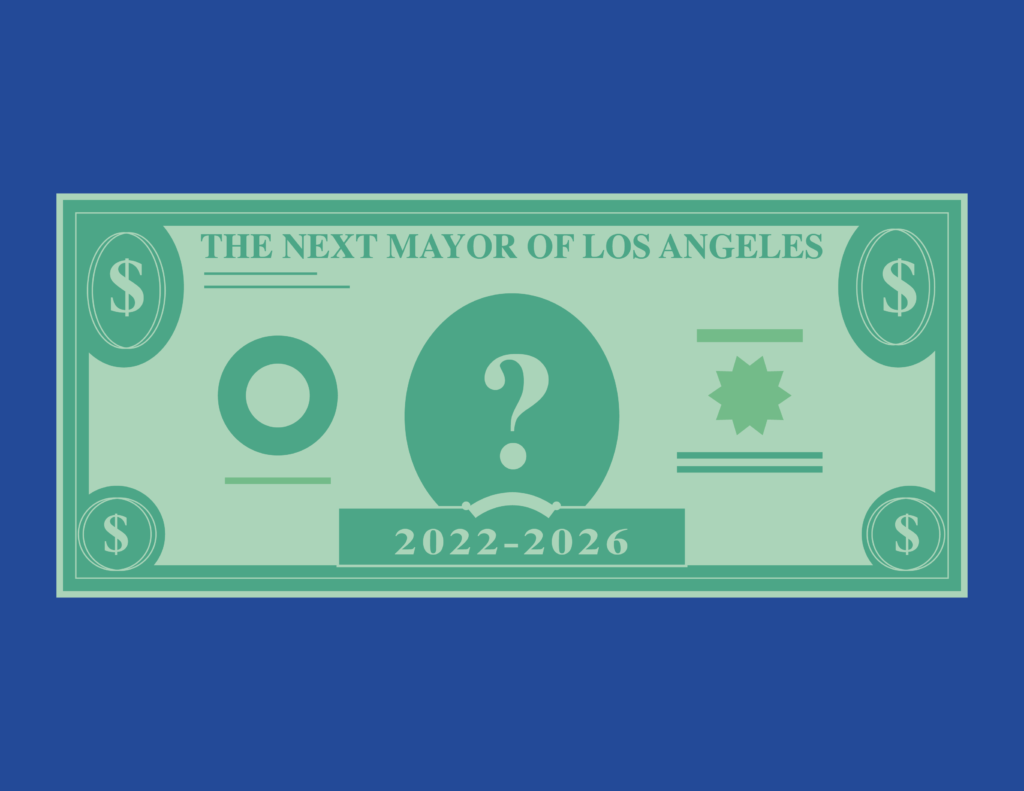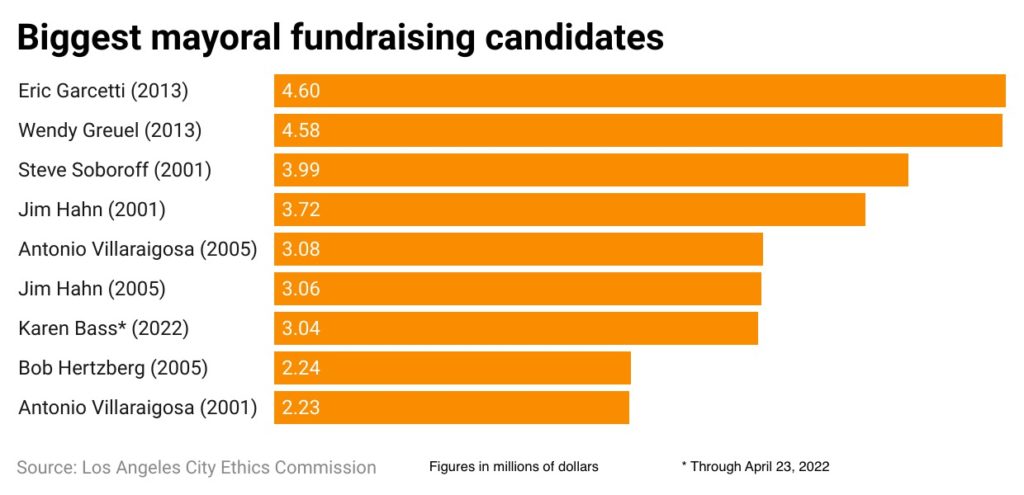Is 2022 L.A.’s most expensive mayor’s race ever? Yes, but also no

No matter who wins the 2022 Los Angeles mayor’s race, when history looks back on the contest, the overwhelming narrative will be about how much money was raised and spent. The driver of this is mall developer Rick Caruso: Through the most recent fundraising reporting period of April 23, he had given $22.5 million to his own campaign.
Step back from that extraordinary allocation, however, and something else is surprising: When it comes to the type of fundraising that involves asking individual donors for up to the maximum amount allowed of $1,500, candidates are actually raising less money than during the most recent competitive election, in 2013. The total campaign tote board is also well below what was pulled in during the 2001 mayor’s race.
[Get COVID-19, crime and other stats about where you live with the Crosstown Neighborhood Newsletter]
Through April 23, the pacesetter for money raised through individual donations was U.S. Rep. Karen Bass, who had accumulated $3.04 million. Even with continued fundraising, she is unlikely to come close to the 2013 primary levels, when Eric Garcetti raised $4.6 million and Wendy Greuel pulled in $4.58 million.
In fact, Bass and Councilmember Kevin de León are the only ones on the ballot this year who so far have raised sums that would rank in the top 12 of money secured when compared with the competitive races of 2013, 2005 and 2001. (The re-election campaigns of Garcetti in 2017 and Antonio Villaraigosa in 2009 were not competitive and drew only token opposition.)

By the recent reporting deadline, Caruso had $571,000 in traditional donations.
Massive loans
Through April 23, the entire field of mayoral candidates raised $35.63 million, according to disclosure statements filed with the City Ethics Commission. This changes drastically when loans are considered: Subtract Caruso’s personal investment, another $4 million that tech entrepreneur Ramit Varma loaned his campaign, and the $100,000 that City Attorney Mike Feuer gave himself, and the total contributions raised by all candidates is $9.05 million.
Again, more money is coming as the June 7 election approaches. Although Feuer and Councilmember Joe Buscaino have dropped out (the former endorsed Bass, the latter is supporting Caruso), active fundraising continues. Bass last week held a star-studded event at the headquarters of J.J. Abrams’ Bad Robot Productions in Santa Monica. Caruso has given his campaign at least another $10 million, according to Ethics Commission disclosures.
Even as the overall totals increase, the 2022 tally seems unlikely to reach the (non-loan) levels achieved in two previous competitive elections. The 2001 race is the high-water mark for money raised in a Los Angeles primary this century: $15.42 million. More significant is that, 21 years ago, the maximum donation allowed was $1,000, or $500 less than today. (Publicly available Ethics Commission records only go back to 2001.)

Different landscape
Although most things today cost more than they did in 2001, there are a few reasons the totals raised by current candidates are relatively low.
The first is that Caruso’s deep pockets have skewed fundraising. Many donors are loath to give money to someone they feel cannot be competitive, and after Caruso declared his candidacy on Feb. 11 and began blanketing the airwaves with commercials, other candidates found it impossible to move forward. Central City Association President and CEO Jessica Lall, who had launched a campaign in September and raised more than $400,000, cited the difficult fundraising environment when she pulled the plug in February.
As he ended his campaign last week, Feuer stated, “Without a major infusion of additional money to stay on the air, I can’t win.”
Other factors have likely altered the fundraising landscape. The economic fallout from the pandemic meant some people had less to give.
Additionally, this marks the first election in which the mayor’s race aligns with state and federal ballots. In recent decades, the mayoral primary took place in the spring of odd-numbered years, and while this produced disappointing turnout, it meant contenders did not have to compete for cash against a slew of other state and national candidates.
Shifting the election is expected to significantly boost the number of people who vote. However, donors in heavily Democratic Los Angeles are also getting asked for money by other Democrats running for office, both in California and across the nation. The result is that some donors are being choosy, deciding where their money can provide the most help.
As election day nears, this is likely just chapter one of the mayoral fundraising. If no candidate secures more than 50% of the vote, the top two finishers will advance to a November runoff. Then, donors who gave in the first round will be asked to open their checkbooks again.
How we did it: We examined the 2022 mayoral fundraising race data up until April 23, 2022 from the City Ethics Commission. Figures are based on what is reported by individual campaigns and updates may not be reflected in this story.
Have questions about our data? Write to us at askus@xtown.la.






